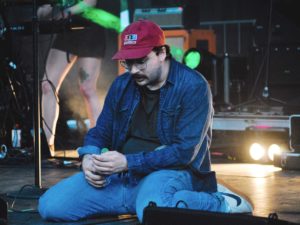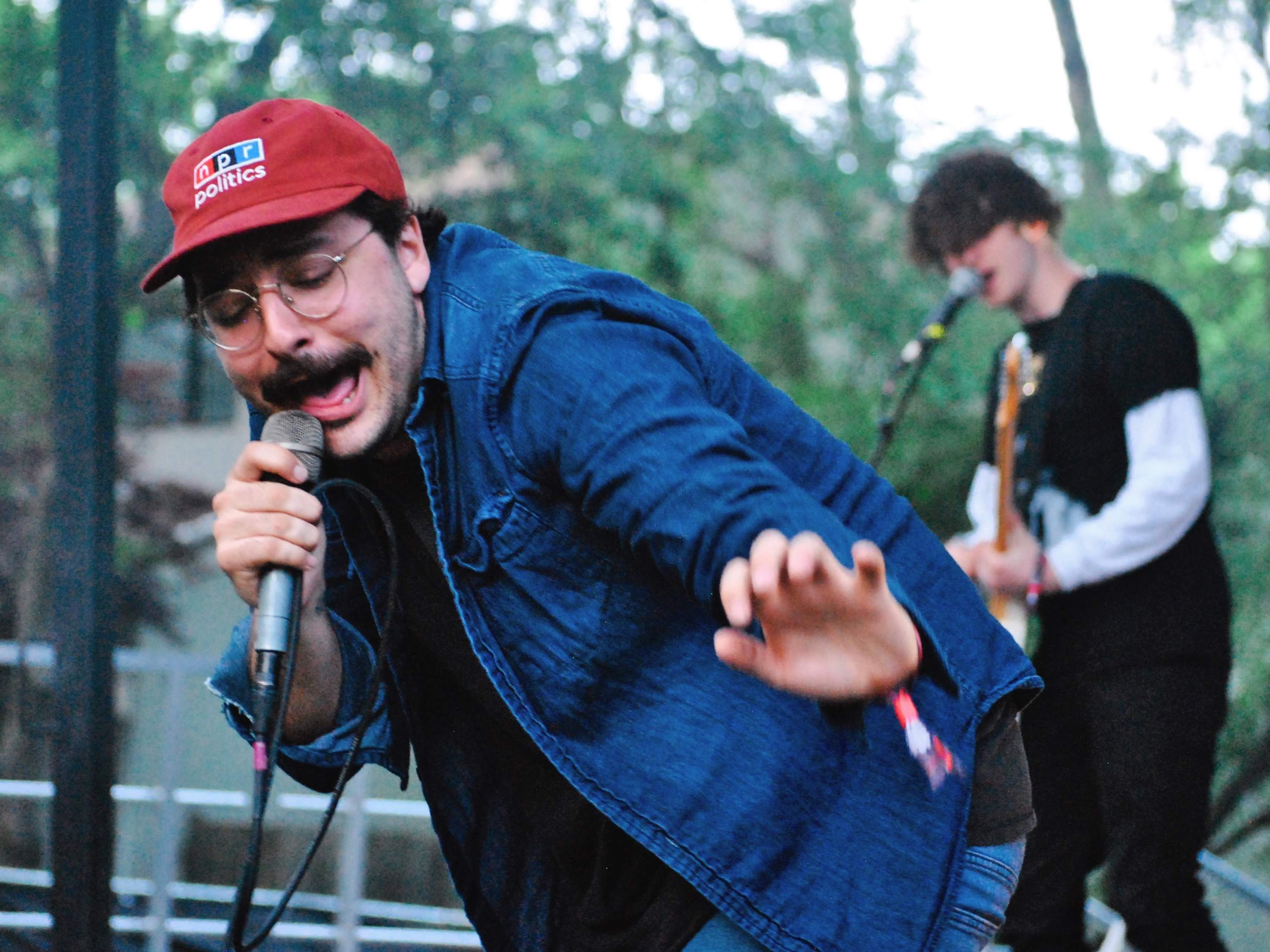At Shaky Knees Music Festival in Atlanta, Conor Murphy seems bewildered. As he and his band Foxing emerge from backstage, he’s taken aback by the crowd; with Incubus on an adjacent stage, Murphy is surprised anyone is watching his band—let alone forming a substantial congregation.
The St. Louis band’s rise has been both rapid and bumpy, first emerging on the emo-revival scene with The Albatross in 2013 before slipping somewhat out of that style with the divisive (though excellent) Dealer in 2015. Last year’s Nearer My God exposed them to a larger audience at the possible expense of some of their older fans, but this was a risk Murphy and his bandmates were willing to take in order to make something impactful.
RELATED: OK, I Guess It’s Time to Rank All Those Active-Verb Bands
Murphy isn’t shy about expressing his ambition. He wants Foxing to be a band who releases great records and also performs great live shows—the latter of which has already undeniably been accomplished, reaching near-mythic proportions. With that aspect of Foxing’s attack fully-formed, they’ve relentlessly pursued perfection in the studio on their upcoming fourth LP, in hopes of equaling Nearer My God. That album presented its ideas nakedly, unflinching and unafraid. It was big and bombastic, an explosion of punk and rock and emo that never committed to any of those ideals fully. In short, it was tremendous, and Murphy might be pursuing a fool’s errand in trying to make a record that will appease rabid fans of their live shows. Still, his goal of embodying the best possible iteration of Foxing propels the band forward. He just wants to see them get bigger and better.
 Foxing is well-known for the energy you bring to live shows. On the back end of a second tour for Nearer My God, does that still come naturally, or is that something you have to manufacture as a performer?
Foxing is well-known for the energy you bring to live shows. On the back end of a second tour for Nearer My God, does that still come naturally, or is that something you have to manufacture as a performer?
I want to say that it’s so easy to just get into it when you care so much, but some nights it’s very, very hard to do. Some nights we really have to push ourselves through it. We had a really grueling few days a couple weeks ago. We did a Tiny Desk and another show the same day, and then two days later we played Shaky Knees and an aftershow. By the time you get to the end of that, you’re like, “I fucking hate live music right now” [laughs]. In those situations, I feel burnt out, but also we know what it’s like to be a person going to a show. We have to push ourselves and put on a good performance. Being from St. Louis, we know it’s a stop that a lot of bands hate. You can really tell when a band doesn’t want to be there. It’s really disappointing, it’s really transparent. Because of that, we all come together and recognize that we may not be feeling a show, but we have to try harder.
That’s the job aspect of being a musician.
Of course. Any time we play in Atlanta, it’s impossible to not get into it because of the way Atlanta crowds treat us. It’s such a wild and engaging experience. We have a lot of favorite cities, but Atlanta really pumps us up every time. There are other cities where no matter what you do, everyone’s just gonna stare at you. As a person that doesn’t really mosh or dance around, I understand that sometimes you don’t wanna move but you’re still enjoying the show. At this point in our career, we’re all very aware of that. We’d love the help, to have people throw energy back at us, but we also know not to rely on that.
A huge part of your live show is how stoked the audience gets, so I’m surprised you don’t get that in some cities.
It’s some cities, but it’s also other countries. Germany is a really good example. It’s an amazing country where people will come out by the hundreds to see a show—our shows will be packed—and they’re all extremely excited. But the second you start playing, they’re all completely still. At the end of every song they freak out, though. I think it’s a matter of respect. It’s a cultural thing, but I think sometimes people just want to stand and watch, and really take in a performance.
Have you noticed any differences in the audience, with this being the second tour behind Nearer My God?
People know the songs better. We got feedback from the first tour from people wanting to hear other songs from our new record. We added three new songs that we didn’t play on the last tour and we’re scaling back songs from the first two records. It was a little bit scary. We have fans who don’t like our new record, and we didn’t want to alienate them. But we really haven’t had any negative feedback. More than anything, it’s been a positive experience. It’s surprising, frankly.
When you were getting ready to put this record out, were you conscious of the fact that you were moving away from what your old fans liked?
If there was a misstep on the second record, it was that we maybe considered that too much. We were trying to move in a direction, but we were also really afraid that we’d alienate people who liked our first record. So what resulted was this half-attempt at a different sound. It worked out for a lot of people, but it didn’t really do what we wanted it to do creatively, and this record feels very different. We decided to go all-in. If we alienated anyone or let anyone down, so be it. They also still have the record they like. That’s how I’ve always felt. With bands I love that put out a great first record and then I hated everything they did after, I still have that first record. I can still listen to that. If anything, it’s a little selfish of me to want them to make the same thing over and over again.
A lot of the talk before your last album was surrounding its grand ambition and epic scope. Do you have that same ambition this time around?
I think we have a lot more ambition on this one! With the last, we set out to make a record that would stand the test of time, and with this one, we’re really trying to do that. We made Nearer, we’re extremely proud of it—it’s very important to us—but we still want more. We feel like we haven’t made our best album yet, but I guess that’s the hope for every band.
“We’re chasing how to make something so good that when we play it live, it pales in comparison. That’s the best problem you can possibly have.”
A lot of times, people will tell us that our live show shines above our recordings. Sometimes people say it nicely, sometimes they’re assholes about it, and they’re like, “I really fucking hate your records but I like the live show.” Either way, though, we’re chasing how to make something so good that when we play it live, it pales in comparison. That’s the best problem you can possibly have.
Maybe that’s the nature of Foxing, though—people are already attached to the live experience and view you as a “live band,” no matter how phenomenal the records are.
I think you’re right. The real problem we have sometimes is where we do these support tours and we play with these incredible bands. We play in front of all these people who have never heard us before and they go, “Wow, this band!” Then they buy our record and they go, “Oh, okay, this isn’t what I thought it’d be.” People think our records match our live energy. With that said, I think we’ve done that better on Nearer My God than any other record we’ve made. But we still want to do more.
 During the last press cycle you talked about how exhausted you were after touring the second album, before you released Nearer. Have you all gotten better at mitigating some of that exhaustion? Or is that just the nature of being a band that tours heavily in 2019?
During the last press cycle you talked about how exhausted you were after touring the second album, before you released Nearer. Have you all gotten better at mitigating some of that exhaustion? Or is that just the nature of being a band that tours heavily in 2019?
I like to think that we’re getting better at it. We’re also more used to it. It’s a weird sunk cost fallacy at this point, where we’ve put in all this time, so we can’t slow down or else it’s all going to go away. We convince ourselves that if we just keep going, if we just do this next tour, something’s gonna change that will make our lives easier. It’s tough because we talk about taking a break, taking a year off, but it always comes back to…we can’t. This is our job and we’re not good at anything else. The thing that’s so tough about it is the day the record’s released is the launch of a new product. You’re just stuck with the product until you make another one. I couldn’t be prouder of the record we just made, but it is a record that requires a lot of attention and requires us to tour a lot.
Is writing one song that gets you to that place a goal of yours?
No, not really. We’ve gotten to know the guys in Manchester Orchestra on a personal level—they are like mentors to us in a lot of ways—and I’ll hit up Andy [Hull] every once in a while and just bounce ideas off of him, whether it be musical or existential. And those guys really grinded for a super long time. They never had a breakout hit, and I think that’s why they have such a loyal fanbase that I’m very much a part of. A huge reason why I love that band and love those records is because there is so much passion put into them. It’s so obvious they weren’t writing radio singles. They were writing album-oriented rock, as they call it. They’ve pushed themselves so hard for so long that now they’re in a place where they don’t have to tour so, so much. They’ve put together a catalog of records that are so meaningful to so many people. That’s the ultimate goal we have, to be in a place similar to them. I want all of our records to be connected, and have it be something we’re entirely proud of. FL







